部分用in的短语
关于in的短语词组

关于in的短语词组嘿,咱今天就来聊聊那些和“in”有关的短语词组吧!你看啊,“in the morning”,每天早上起来,咱不就得迎接新的一天嘛,就像太阳准时升起一样平常又重要。
比如说,“I get up in the morning and start my day.”(我早上起床然后开始我的一天。
)还有“in class”,在课堂上呀,那可是学习知识的地方。
想象一下,同学们都聚精会神地听老师讲课,“We should listen carefully in class.”(我们在课堂上应该认真听讲。
)多有意思!“in a hurry”,着急忙慌的时候谁没有过呀!就像那次我赶着去看电影,一路小跑,“I was in a hurry to catch the movie.”(我急着去看那部电影。
)“in fact”,事实上呢,很多事情往往和我们想的不一样。
“In fact, things are not always as simple as we think.”(事实上,事情并不总是像我们想的那么简单。
)“in trouble”,遇到麻烦的时候可真让人头疼啊!就像不小心弄丢了重要的东西,“He is in trouble because he lost his key.”(他有麻烦了,因为他丢了钥匙。
)“in love”,哇哦,陷入爱情的时候那种感觉多美妙呀!看着那些情侣们甜甜蜜蜜的,“They are deeply in love with each other.”(他们深深地爱着彼此。
)你说,这些和“in”有关的短语词组是不是特别有意思?它们就像生活中的小片段,把我们的日常点缀得丰富多彩。
它们在我们的交流和表达中起着重要的作用,让我们能更准确、生动地描述我们的经历和感受。
所以呀,可得好好记住它们,让它们为我们的语言增添魅力呀!我的观点就是,这些“in”的短语词组真的是太实用啦,是我们英语学习中不可或缺的一部分呢!。
介词短语大全
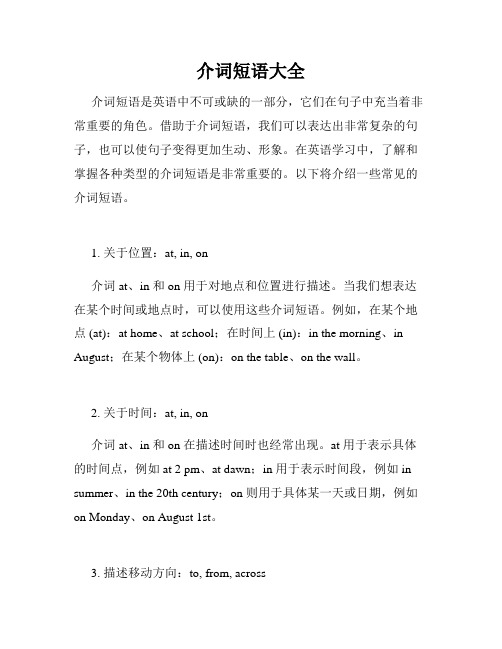
介词短语大全介词短语是英语中不可或缺的一部分,它们在句子中充当着非常重要的角色。
借助于介词短语,我们可以表达出非常复杂的句子,也可以使句子变得更加生动、形象。
在英语学习中,了解和掌握各种类型的介词短语是非常重要的。
以下将介绍一些常见的介词短语。
1. 关于位置:at, in, on介词 at、in 和 on 用于对地点和位置进行描述。
当我们想表达在某个时间或地点时,可以使用这些介词短语。
例如,在某个地点 (at):at home、at school;在时间上 (in):in the morning、in August;在某个物体上 (on):on the table、on the wall。
2. 关于时间:at, in, on介词 at、in 和 on 在描述时间时也经常出现。
at 用于表示具体的时间点,例如at 2 pm、at dawn;in 用于表示时间段,例如in summer、in the 20th century;on 则用于具体某一天或日期,例如on Monday、on August 1st。
3. 描述移动方向:to, from, across介词 to、from 和 across 用于描述人或物的移动方向。
例如:我要去北京 (I'm going to Beijing.)、他从学校回家 (He is going home from school.)、我们要走过桥 (We are walking across the bridge.)。
这些介词短语可以使句子更加直观。
4. 描述原因和目的:for, because of, in order to介词 for、because of 和 in order to 分别表示某些事件的原因和目的。
例如:我学英语是为了进一步提高自己 (I study English in order to improve myself.)、我迟到了,因为堵车了 (I was late because of the traffic.)、我买了一份礼物送给他 (I bought a gift for him.)。
in的用法及区别
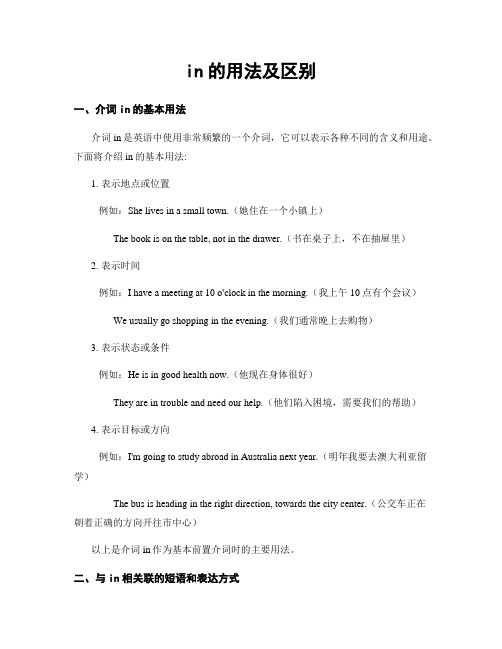
in的用法及区别一、介词in的基本用法介词in是英语中使用非常频繁的一个介词,它可以表示各种不同的含义和用途。
下面将介绍in的基本用法:1. 表示地点或位置例如:She lives in a small town.(她住在一个小镇上)The book is on the table, not in the drawer.(书在桌子上,不在抽屉里)2. 表示时间例如:I have a meeting at 10 o'clock in the morning.(我上午10点有个会议)We usually go shopping in the evening.(我们通常晚上去购物)3. 表示状态或条件例如:He is in good health now.(他现在身体很好)They are in trouble and need our help.(他们陷入困境,需要我们的帮助)4. 表示目标或方向例如:I'm going to study abroad in Australia next year.(明年我要去澳大利亚留学)The bus is heading in the right direction, towards the city center.(公交车正在朝着正确的方向开往市中心)以上是介词in作为基本前置介词时的主要用法。
二、与in相关联的短语和表达方式1. be interested in这个短语表示对某事感兴趣的意思。
例如:She is interested in learning new languages.(她对学习新语言很感兴趣)2. be involved in这个短语表示参与某种活动或事情。
例如:He is involved in a charity campaign to help those in need.(他参与了一项慈善活动,帮助那些有需要的人)3. result in这个短语表示导致某种结果。
介词的常见搭配与短语用法
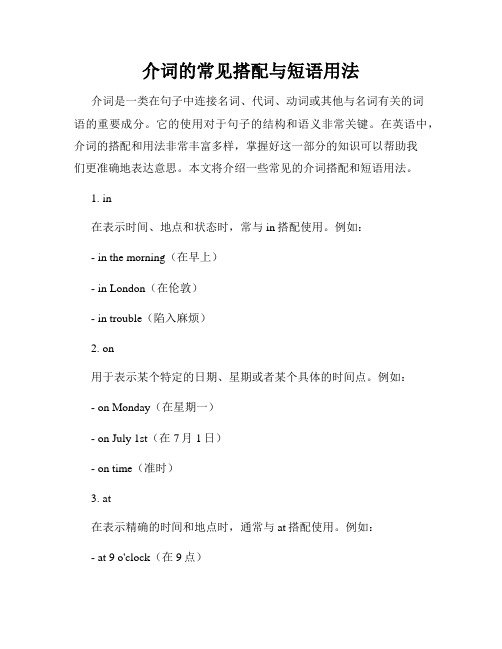
介词的常见搭配与短语用法介词是一类在句子中连接名词、代词、动词或其他与名词有关的词语的重要成分。
它的使用对于句子的结构和语义非常关键。
在英语中,介词的搭配和用法非常丰富多样,掌握好这一部分的知识可以帮助我们更准确地表达意思。
本文将介绍一些常见的介词搭配和短语用法。
1. in在表示时间、地点和状态时,常与in搭配使用。
例如:- in the morning(在早上)- in London(在伦敦)- in trouble(陷入麻烦)2. on用于表示某个特定的日期、星期或者某个具体的时间点。
例如:- on Monday(在星期一)- on July 1st(在7月1日)- on time(准时)3. at在表示精确的时间和地点时,通常与at搭配使用。
例如:- at 9 o'clock(在9点)- at the airport(在机场)- at the meeting(在会议上)4. by表示通过某种方式、方法或交通工具。
例如:- by car(乘车)- by email(通过电子邮件)- by foot(步行)5. with表示伴随或携带某物或与某人在一起。
例如:- with a book(带着一本书)- with my friends(和我的朋友们一起)- with a smile(带着微笑)6. for表示某个目的、理由或者表示时间段。
例如:- for fun(为了好玩)- for the party(为了聚会)- for three hours(连续三个小时)7. to表示方向、目的地或者某个限定条件。
例如:- to the store(到商店)- to learn(为了学习)- easy to use(容易使用)8. from表示出发地点、来源或者与之相反的方向。
例如:- from home(从家里)- from China(来自中国)- from top to bottom(从上到下)9. of表示所属关系、材料或者某种性质。
in的用法归纳总结
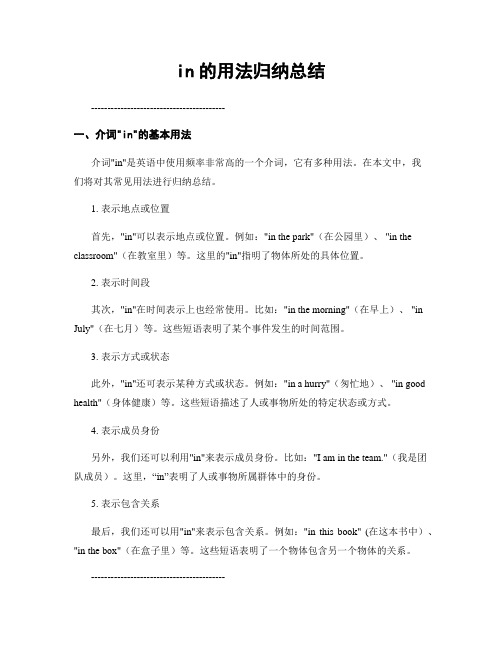
in的用法归纳总结-----------------------------------------一、介词"in"的基本用法介词"in"是英语中使用频率非常高的一个介词,它有多种用法。
在本文中,我们将对其常见用法进行归纳总结。
1. 表示地点或位置首先,"in"可以表示地点或位置。
例如:"in the park"(在公园里)、 "in the classroom"(在教室里)等。
这里的"in"指明了物体所处的具体位置。
2. 表示时间段其次,"in"在时间表示上也经常使用。
比如:"in the morning"(在早上)、 "in July"(在七月)等。
这些短语表明了某个事件发生的时间范围。
3. 表示方式或状态此外,"in"还可表示某种方式或状态。
例如:"in a hurry"(匆忙地)、 "in good health"(身体健康)等。
这些短语描述了人或事物所处的特定状态或方式。
4. 表示成员身份另外,我们还可以利用"in"来表示成员身份。
比如:"I am in the team."(我是团队成员)。
这里,“in”表明了人或事物所属群体中的身份。
5. 表示包含关系最后,我们还可以用"in"来表示包含关系。
例如:"in this book" (在这本书中)、"in the box"(在盒子里)等。
这些短语表明了一个物体包含另一个物体的关系。
-----------------------------------------二、与“in”相关的常见短语除了上述基本用法外,有一些与“in”相关的常用短语也非常值得我们注意和学习。
in组成的短语

1. in a hurry 匆忙地;in doubt 有疑问,不确定2. in a measure 在某种程度上3. in a sense=in a sort of sense 从某种意义上来说, in this sense, 从这种意义上来说,in my personal sense 依我之见4. in a way 在某种程度上;in a …way 以…方式;in an odd way 以奇怪的方式,奇怪地;ina …fashion=in a … manner 以…方式;in the same way 以同样的方式,就像5. in accord with 与…一致; out of one’s accord with 同…不一致6. in accordance with =in agreement with=according to 依照, 根据7. in advance beforehand 预告, 事先,提前8. in addition to 另外,除…之外9. in all altogether 总共, 总计10. in the air 在流行,在传播; 不确定11. in any case 无论如何,总之; in case of 后接短语假使,万一; in case后接从句假如,以免,万一; in no case 决不12. in blossom 开花指树木 ; come into blossom 开花强调动作13. in brief=in short=in a word=in as few words as possible简言之14. in bulk 大批的,不散装的,大宗的15. in charge of 负责,主管; in the charge of 由…管理16. in common with 和…有共同点17. in comparison with =in contrast to 和…比起来18. in conclusion 最后,总; at the conclusion of 当…结束时19. in/out of condition 健康状况好/不好,in good badcondition 处于良好坏状态20. in connection with/to 关于,和…有联系21. in consequence 因此,结果;in consequence of 由于…的缘故22. in contrast with/to 与…成对照;与…对比23. in the course of 在…过程中,在…期间24. in danger/trouble 在危险中,垂危25. in debt 欠债26. in details 详细地;in demand 有需求27. in despair 绝望28. in difficulties/trouble 处境困难; in a dilemma 进退两难,左右为难29. in the distance 在远处30. in essence 本质上31. in excess of=more than 超过,过多32. in any event 无论如何;in the event of 万一,如果发生33. in excuse of 作为…的借口34. be in existence存在; come into existence 出现35. in the eyes of sb./ in one’s eyes 在某人看来, 在某人眼里36. in fact=in effect =in truth=in reality实际上37. in the face of 面对,不顾38. in fashion时兴, 流行39. in force有效;实施中40. in favour of 有利于,赞成,支; in one’s favor=to one’s advantage对…有利41. in the form of 以…形式42. in front of 在…前面;in a tight corner 陷入困境43. in the future 今后,将来;in the near future 在不久将来44. in good faith=honestly, sincerely 真诚地45. in general 通常,大体上46. in good taste大方,得体; 反义in bad taste47. in hand 在掌握中,在控制中48. in half 成两半;in itself 本身49. in honor of 以纪念,向…表示敬意50. in the least 一点,丝毫52. be in the habit of 习惯于53. in the grips/hands of/with 由…掌握, 控制, 负责54. in the light of =considering; taking into account 考虑到, 根据55. in line 成一直线,排成一行; in line with 与…一致,按照56. in the long run 最终,从长远观点看;In the short run 从短期来说57. in the mood for 有情绪去做, 有心境做58. in a mess 乱七八糟, 处境困难59. in nature 本质上;In the nature of 属于….性质60. in a moment 立刻,马上61. in memory of 纪念62. in one’s opinion 按某人的看法63. in sight 被看到,看得见64. in spite of 不管,不顾;尽管,虽然65. in step 同步,合拍;步伐一致; out of step 步伐不齐66. in stock 现有,备有67. in sum 总而言之68. in secret 秘密地,私下地;in public 公开地,当众;in private 私下里69. in shape 处于良好状态70. in tears 流着泪,含泪,哭71. in terms of 依据,按照;用…措词72. in return 作为报答,作为回报; in turn 反过来,按顺序73. in practice 在实际中,实践中;in theory 理论上74. in proportion to 与…成比例75. in a position of=be able to 设身处地去,能够做到76. in question 正在讨论,有问题的;in dispute 有争议的77. in order 秩序井然,整齐; in order to 以便, 为了; in order that 以便78. in particular 特别地,尤其,详细地; in part 部分地79. in the past 在过去,以往80. in person 亲自, 当面; in principle 原则上81. in place 在适当的位置,得体,合适82. in place of 代替83. in the first place 起初,首先;in the last place 最后84. in no time 马上85. in the twinkling of an eye 一眨眼, 转眼间86. in search of 寻找; in the hope of希望,期待; in pursuit of 为…追求; in/on behalf of为…的利益; in favor/support of 支持87. in sequence 按顺序, 按先后次序88. in short =in a few words, in brief简称, in short supply 供应不足89. be in touch with 与…有接触, 有联系; be out of touch with与…没有联系或接触90. in timefor 及时;on time =punctually 准时91. in that 因为,就在于92. in the wake of 在…之后; in the company of 伴随着93. in the way of 关于…方面94. in this regard 在这一点上,关于这一点95. in total =all have been added up 总计96. in vain =uselessly 徒劳地97. in view of =considering 考虑到; in the view of 按…的意思98. in a word总之; in other words换言之99. in the vicinity 在附近; in close vicinity to 在靠近…的地方; in the vicinity of 大约; in theorder of 大约100. in vogue 正时兴,在流行101. in need of 需要,badly in need of 急需102. in the extreme 极其。
介词 in 的用法总结
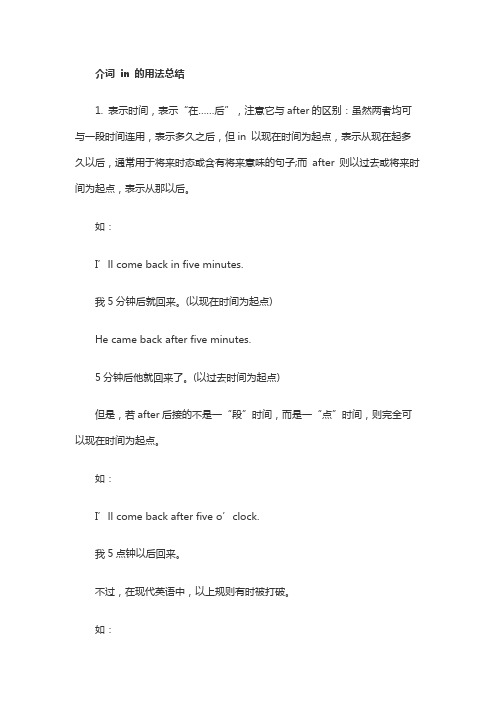
介词in 的用法总结1. 表示时间,表示“在……后”,注意它与after的区别:虽然两者均可与一段时间连用,表示多久之后,但in 以现在时间为起点,表示从现在起多久以后,通常用于将来时态或含有将来意味的句子;而after 则以过去或将来时间为起点,表示从那以后。
如:I’ll come back in five minutes.我5分钟后就回来。
(以现在时间为起点)He came back after five minutes.5分钟后他就回来了。
(以过去时间为起点)但是,若after后接的不是一“段”时间,而是一“点”时间,则完全可以现在时间为起点。
如:I’ll come back after five o’clock.我5点钟以后回来。
不过,在现代英语中,以上规则有时被打破。
如:I may come after a day or two.我可能过一两天会来。
Wang Bing is leaving the USA after two days.两天后王兵要离开美国。
2. 类似in three days 这样的短语,有时含义不易确定,因为它既可表示“3天内”,也可表示“3天后”,大致可以这样区分:若与延续性动词连用,则表示“3天内”,若与非延续性动词连用,则表示“3天后”。
如:He learnt English in three weeks.他在3周内学会了英语。
The train will arrive in a few minutes.火车过几分钟就到。
但语言的实际并不完全是这样,有时需视具体的上下文或语境来确定。
如:We should be able to complete the work in five days.我们应该能在5天内完成这工作。
为了明确语义,有时人们就分别用within 和after 来表示“在……内”和“在……后”:I’ll see you again within three days.3天内我再来看你。
in的用法和意思
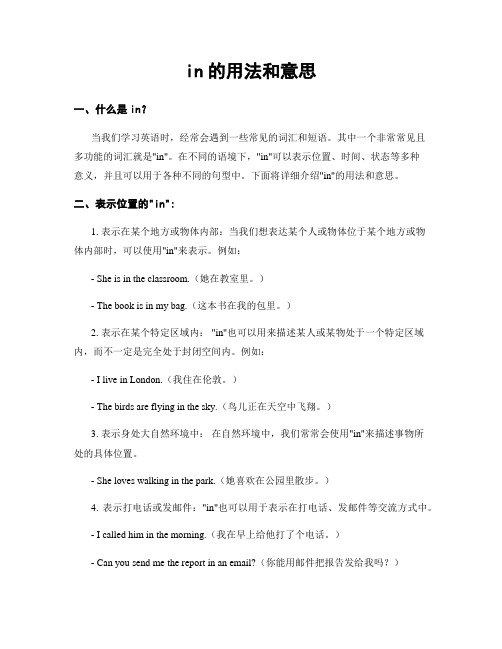
in的用法和意思一、什么是in?当我们学习英语时,经常会遇到一些常见的词汇和短语。
其中一个非常常见且多功能的词汇就是"in"。
在不同的语境下,"in"可以表示位置、时间、状态等多种意义,并且可以用于各种不同的句型中。
下面将详细介绍"in"的用法和意思。
二、表示位置的"in":1. 表示在某个地方或物体内部:当我们想表达某个人或物体位于某个地方或物体内部时,可以使用"in"来表示。
例如:- She is in the classroom.(她在教室里。
)- The book is in my bag.(这本书在我的包里。
)2. 表示在某个特定区域内: "in"也可以用来描述某人或某物处于一个特定区域内,而不一定是完全处于封闭空间内。
例如:- I live in London.(我住在伦敦。
)- The birds are flying in the sky.(鸟儿正在天空中飞翔。
)3. 表示身处大自然环境中:在自然环境中,我们常常会使用"in"来描述事物所处的具体位置。
- She loves walking in the park.(她喜欢在公园里散步。
)4. 表示打电话或发邮件:"in"也可以用于表示在打电话、发邮件等交流方式中。
- I called him in the morning.(我在早上给他打了个电话。
)- Can you send me the report in an email?(你能用邮件把报告发给我吗?)三、表示时间的"in":1. 表示某个特定时刻:在英语中,我们经常用"in"来表达某个特定的时间点。
例如:- We will meet at 9 o'clock in the morning.(我们将在早上9点见面。
- 1、下载文档前请自行甄别文档内容的完整性,平台不提供额外的编辑、内容补充、找答案等附加服务。
- 2、"仅部分预览"的文档,不可在线预览部分如存在完整性等问题,可反馈申请退款(可完整预览的文档不适用该条件!)。
- 3、如文档侵犯您的权益,请联系客服反馈,我们会尽快为您处理(人工客服工作时间:9:00-18:30)。
部分用in的短语:in English, in a good way, in a hurry,in pen / ink (见105), in the day(见92), in different sizes, in different shapes, in a difficult situation, in good health,in a red coat / in red(见46), in style, in the open air(露天场所)2010-10-11 09:17 回复美丽的雾凇229位粉丝3楼59.比较级与最高级部分要点:1不规则形式或易错形式:much/many→more→most bad/badly/ill→worse→worstfar→farther/further→farthest/furthest little→less→least few→fewer→fewest old→older/elder→oldest/eldest以ly结尾的形容词常把-ly换成-lier/-liest.2常见比较级/最高级句型:He runs faster than me. (有than)He did better than any other student in the school. (参照48) Tom is the cleverest boy in his class. (某个范围内)He is the taller of the two (boys). (两者,此句型中加the)He is the tallest of the three (boys). (三者)Which is better, tea or milk? (两者选择)Which is the best, tea, milk or water? (三者选择)It’s the second longest river in China. (序数词后用最高级。
)3“越来越…”比较级+and +比较级He cried harder and harder. She is getting taller and taller. 类似:bigger and bigger / happier and happier / fatter and fatter / stronger and stronger / richer and richer / worse and worse…另一种情况:more and more beautiful / slowly / carefully /…4“越…, 越…”“the+比较级”分别置于两句的开头,倒装。
The more difficult English is, the harder you should study. The younger we are, the more energy we have.The more you eat, the fatter you will get.5“越来越多的…”more and more +名词More and more people are getting richer and richer.We need more and more desks / paper / trees / water ….6“…得多”much + 形容词/副词比较级This room is much bigger than that one.类似:much taller/fatter/younger/heavier/faster/earlier/better…以及:much more careful/difficult/tiring/similar/mysterious…7“另外的…(个) …”结构:数量+ more + 名词one more towel, three more suits, many more tiles,much more truth, some more meat, a lot more wood,a little more experience, once more = one more time = again.这种结构有时也可用another + 数字 + 名词替代:five more trees = another five trees (记住词的位置)2010-10-11 09:19 回复美丽的雾凇229位粉丝4楼60.talk, tell, say, speak: 1talk只作不及物动词。
Don’t talk in class. Shall we talk about our English study?He is talking with his teacher. May I talk to you?(talk with/to sb talk about sth)2tell只作及物动词,“告诉;讲”。
常接双宾结构。
Mr. Li told us an interesting story. Who told you the news?3say必须接有内容。
Please say it in English. He said nothing.“I disagree with you.” said Tom. What will you say?say 若接sb, 则需先加to: I must say sorry to you.“I overslept this morning.” he said to me.4speak“说话”不及物动词。
He spoke too fast for me to follow.接人时先加介词to. May I speak to Mr. Smith?可表说话的能力。
The baby can speak now.There is something wrong with his throat, he can’t speak.“演讲,发言”Who will speak in the meeting?“说”可作及物动词。
2010-10-11 09:20 回复美丽的雾凇229位粉丝5楼61。
sometimes/some times/sometime/some time:sometimes: “有时”=at times. He is imes late for school.some times: “几次”I have been to Nanjing some times.sometime: “某一时刻”I bought it sometime last spring.We’ll meet again sometime next week.some time: “一段时间”We have to stay here for some time.2010-10-11 09:20 回复美丽的雾凇229位粉丝6楼62.need 的用法:1need可当情态动词(和can等用法类似,但need只用于疑问句或否定句中):Need I go now? (need 在一般疑问句的开头) I needn’t tell you the answer. (否定句中直接在need后加not) 【当情态动词时,need无时态变化。
】2need 可当行为动词(和want 等用法类似):He needs a bike. (后可直接加名词)I need to go over my lessons. (后接带to不定式)Do you need to have a rest? (一般疑问句中do, does, did在句首)We don’t need to wait for her coming. (否定句中do,does,did提前)【注:need 后接表被动的内容时,可表达为:The TV needs to be repaired. = The TV needs repairing.】2010-10-11 09:20 回复美丽的雾凇229位粉丝7楼63.do with 与deal with: 都译为“处理,对付,安排,应付”What have you done with themilk? 用what提问。
How shall we deal with this problem? 用how提问。
下面两句由此而来:Could you tell me what to do with the milk?Could you tell me how to deal with this problem?2010-10-11 09:21 回复美丽的雾凇229位粉丝8楼64.就近原则:常见的有:Either you or Lucyis wrong.There is a dog and two cats in the yard. (there be句型)Not only you but (also) Iam strict in the work.Neither you nor Lucy has seen the film before.2010-10-11 09:21 回复美丽的雾凇229位粉丝9楼65.主谓一致:One/Neither of you is right. (单数谓语)Tom, with his friends, has gone. (主语是Tom, 单数谓语)This pair of shoes looks beautiful. (主语是pair, 单数谓语)The shoes look beautiful. (主语无pair, 复数谓语)Every boy and every girl has a chance to do it. (单数谓语)The old need to be looked after carefully. The young are energetic.(the 加形容词表一类人,谓语用复数)Mr. and Mrs Green are from America. 指格林夫妇 (复数谓语)The teacher and writer is an able man.指教师兼作家, 一个人,单数谓语。
Both you and I are excited about the news. (复数谓语)the number of与a number of参见39. (分数表达见50)2010-10-11 09:22 回复美丽的雾凇229位粉丝10楼66.quite/such/really用法之一:如果出现不定冠词时,常放在后面。
